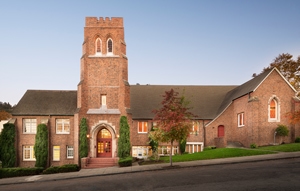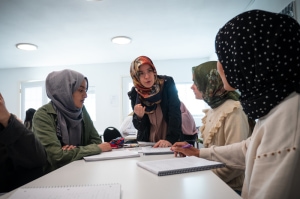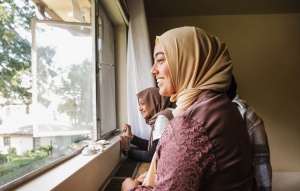Honoring the Dignity of the Displaced
Senior Studies Prophetic Models for Community Integration
Growing up in South Africa, Zaytuna College senior Iman Sulaiman was struck by the stark contrast between luxury and poverty — as well as their proximity. The ghettos of Capetown were just a short drive from the city’s most affluent neighborhoods. How much suffering could be addressed, she wondered, if everyone who lived in this beautiful area took some responsibility for their impoverished neighbors?
Years later, in her Shafi fiqh class at Zaytuna College, she read Reliance of the Traveler, the classic manual for Islamic sacred law, and learned that when giving zakat, Muslims should prioritize those closest to them. “Wherever we find ourselves, we should have a commitment to helping the people around us,” Shaykh Faraz Khan also said in his sirah course, echoing the same principle.
Zaytuna College amplified the Islamic principles on which Iman had been raised and deepened her commitment to service. As a volunteer on a medical mission in Turkey, she was inspired by Syrian refugees. Far from being helpless and dependent, they were educated, capable, and full of agency, moving through a transition that was full of potential for them as well as their new communities. And yet they remained isolated from local culture.
These experiences led Iman, now a senior, to choose the subject of refugees and community integration for her senior thesis. Last month she completed her BA colloquium, an opportunity for students to present their work in progress and critically engage with their professors and peers.
According to a 2023 UNHCR study, Iman said, there were 8 million refugees — many from Muslim majority countries. Yet refugee policies are influenced by Kantian ethics and enlightenment ideals — not Qur’an or Sunna. According to Kant, dedication to the state bonds human beings. Islam offers humanity a far more powerful bond: faith and devotion. How might this bond activate community integration according to principles of belonging and altruism? Seeking solutions by studying a prophetic model, Iman is focused on the early Hijrah period.
“Zaytuna taught me to discern the premises of philosophical understandings. For each philosophy there is a corresponding social model,” Iman said, “And for Muslims, prophetic society is our model.”
Her work-in-progress brings Islamic principles of care into policy considerations and recognizes our responsibility to care for others as essential to community integration and refugee prosperity. Next Iman intends to research the policies of other faith-based organizations. After all, she points out, scripture is full of prophets who were tested by the command to leave home. While her work is inspired by the overwhelming number of displaced Muslims in majority Muslim countries, it addresses the dignity of displaced people everywhere.
“Refugees are no different from us,” she said. “Any one of us could become one in the blink of an eye.”



